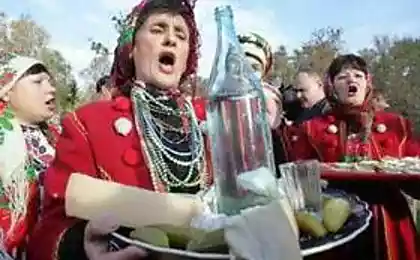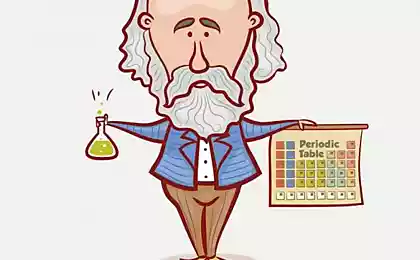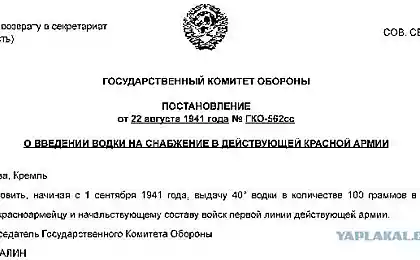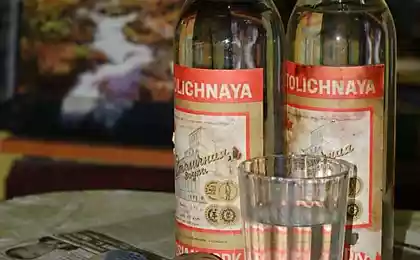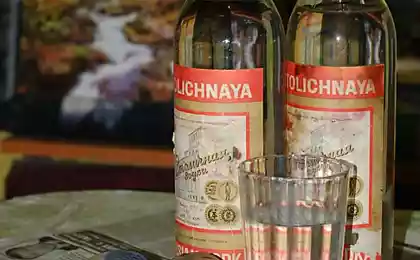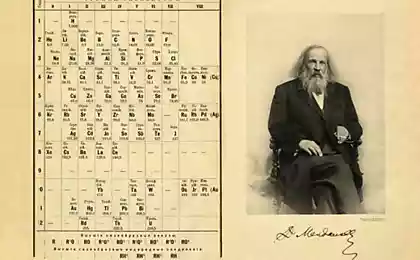885
Birthday vodka
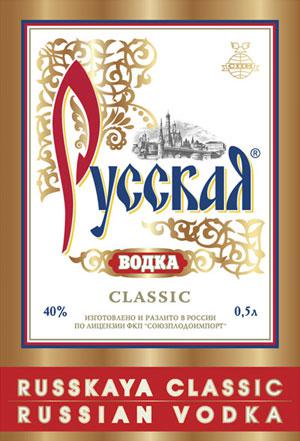
140 years ago it defended the thesis Mendeleev's famous vodka. January 31, 1865 great chemist Dmitri Mendeleev defended his doctoral thesis "On the connection of alcohol and water." Some scientists believe that it was she, and became the basis for the "right of vodka." But other researchers believe that the 40-degree standard - it's just beneficial for the government monopoly proportsiya.

The truth - in wine
Ironically, the biggest Dictionary by Vladimir Dal, does not release "vodka" as a word with an independent meaning and is considering as part of the word "wine". At the same time, and Dahl gives the word "vodka" as "water." If we consider that this dictionary was compiled on the basis of language that existed before the 60-ies of the XIX century, it is likely that the word "vodka" at this time was not common in the value of the alcoholic beverage. On the other hand, the drink itself has been known and actively uses people. Moreover, the "Dictionary of the Old Slavonic language", compiled on the basis of written documents IX-XIII centuries, existed throughout the Slavic world, ie the Czech Republic, Moravia, Bulgaria, Serbia, Poland, Belarus, Moldova and Ancient Russia also does not include the word " vodka ". Only in the dictionaries published in the late XIX - early XX century, it is found in its modern meaning as "strong drink».
It can be concluded that "vodka" is starting to make first steps in the second half of the XIX century. However, this does not mean that as long as there was no words, there was no vodka itself.
Renowned historian William Pohlebkin cooking, believes that in the period between IX and XIV centuries in ancient Rus they drank contentedly, Berezovytsya, wine, honey, kvass, strong drink ol. Most of these drinks was alcoholic, make intoxicated. Nonalcoholic was only sated already Berezovytsya was not completely alcohol-free, as distinguished Berezovytsya simple and Berezovytsya drunk. The same applies to kvas.
It should be noted that not even any water recognized in IX-XI centuries "drink" only water "live", that is, running, spring. In the middle of the XIII century, the term disappeared from the spoken language and is only in fairy tales.
Chairman of the Board of the National Alcohol Association Pavel Shapkin also of the opinion that in Russia until the XV century, drank mead and beer. Maximum Fortress was the first 14, 5 degrees, and beer - about four. Also used the infusion of fruits of wild hops, which had a fortress, but contained a stupefying substances. According Shapkina vodka appeared in the XIV century and has been used solely for the infusion of herbs on it. By the middle of the XV century, there are distilleries producing is a strong drink, and he is firmly in the everyday life of the Russian people. The first pubs opened in Russia in the XVI century, and in 1648 in Moscow and other cities have already swept tavern riots broke out on the basis of "showdown" indebted drinkers and innkeeper, demanding debt.
Officially, the term "vodka" (strong drink) was first mentioned in the decree of Elizabeth I «This allowed to have cubes for doubling vodkas", published June 8th 1751. In 1902, after almost 150 years, this term appears in another decree, issued in connection with the introduction of the state monopoly on vodka production and trade. From the beginning of the twentieth century "vodka" definitively supplanted all other existing definitions - "green wine", "Belenky", "white", "Monopolka", "Popovka" etc.
Legend of vodke
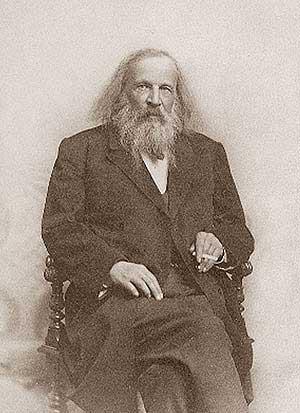
There is a legend that the great chemist and father of the periodic table of Dmitri Mendeleev is also the creator of the Russian (Moscow) "monopoly" of vodka. "Legend, this seems a long time ago and now it is difficult to say who was its author, - the director of the museum-archive at the Mendeleev St. Petersburg University, doctor of chemical sciences Igor Dmitriev. - Probably, "words and music" folk ».
William Pohlebkin in his books, on the contrary, stubbornly defends the theory that the "author" of this vodka was just Mendeleev. His doctoral thesis "On the connection of alcohol with water" was dedicated to "scientific" anatomy ", an analysis and definition, explanation and discovery of unusual physical and chemical properties of the" vodka. According Pokhlebkin, namely Russian chemist found "the perfect ratio of the volume and weight of the parts of alcohol and water in the vodka" and made an important technological discovery. After this was mixed to various amounts of water and alcohol, Mendeleev same "spent mixing different weight samples of water and alcohol, which is much more difficult and which gave more accurate results" - alcohol content in the water should not exceed 40 degrees.
Arguing with Pohlebkin Igor Dmitriev stressed that "the thesis is devoted to studying the periodic spirtovodnyh solutions specific weights depending on their concentration and temperature. In the fifth chapter of this work Mendeleev said: "... I have made a study of the specific weight of a mixture of anhydrous alcohol with water, ranging from 100 to 50% by weight & quot ;. Measurements were taken at intervals of 5% and at different temperatures. Solutions with a concentration of alcohol of 55% to 40% Mendeleev considered in chapter 4 on the definition of "maximum compression that occurs when mutual dissolution of anhydrous alcohol and water." They found that the greatest compression is responsible solution with the alcohol concentration of about 46% (by weight) & quot; .
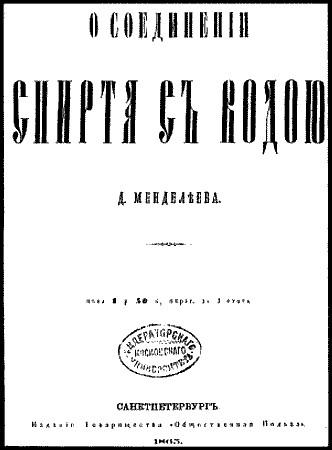
According to the St. Petersburg scholar, "to submit the periodic creator of the product itself, scientists discovered the" perfect "alcohol-water system with the" unusual "properties would not be entirely correct. The actual "inventor" Russian (Moscow) vodka was, firstly, the Russian people, and secondly, if we talk about forty degrees standard (and profitable for the state treasury in degrees) - the Russian government ".


